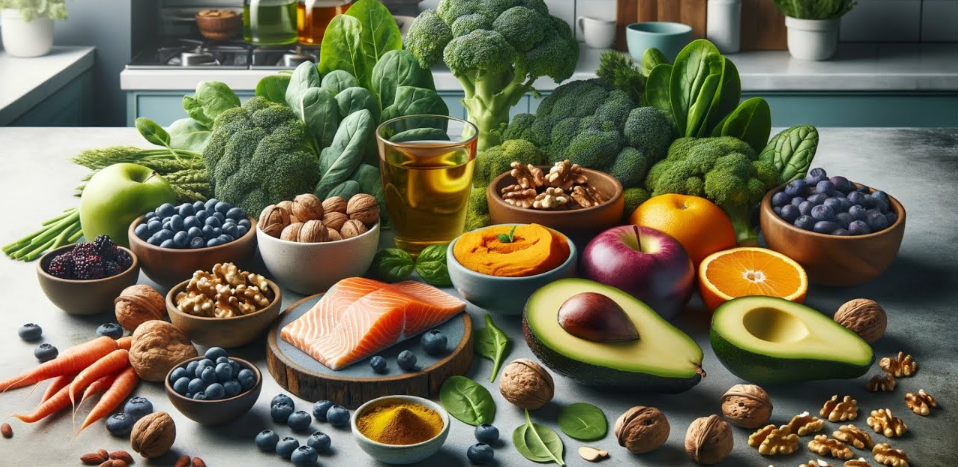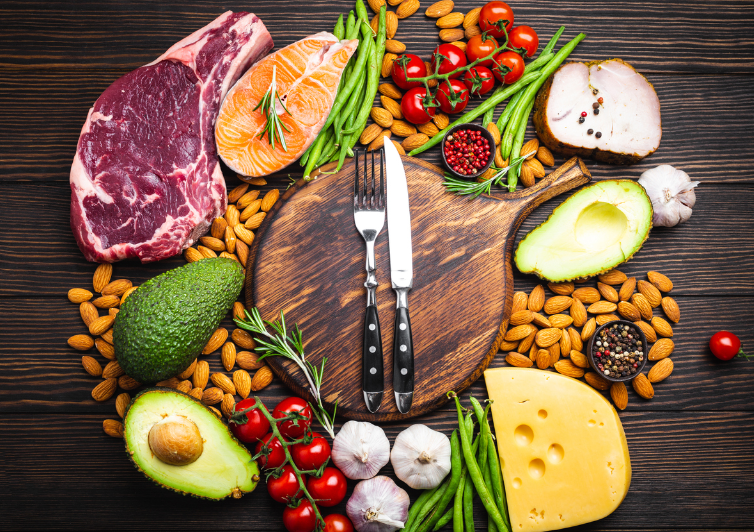What is Healthy Foods?
Nutrients that are important for your body’s proper operation are found in healthy foods. Consuming a range of these foods can improve your general well-being, maintain your energy levels, and lower your chance of developing chronic illnesses.
The Value of Nutritious Foods
- Nutrient-Rich: Vegetables are rich in fiber, antioxidants, vitamins, and minerals.
- Boosting Energy: They give you the energy you need to go about your everyday business.
- Disease Prevention: Eating these foods can lower the chance of developing long-term health problems.
- Weight control: They support the upkeep of a healthy weight.
Components of Healthy Foods
- Fruits
- Fruits are a natural sweet treat rich in vitamins and minerals.
- Apples, bananas, oranges, berries, and grapes are a few examples.
- Benefits include improved digestion, increased energy, and a strengthened immune system.

- Greens
- A balanced diet must include vegetables. They are rich in nutrients yet low in calories.
- Broccoli, carrots, spinach, and bell peppers are a few examples.
- Benefits: Promotes skin health, lowers inflammation, and supports heart health.

- Trim Proteins
- Muscle growth and repair depend on protein. Unhealthy fats are scarce in lean proteins.
- Fish, tofu, turkey, and chicken breast are a few examples.
- Benefits: Increases muscular mass, boosts metabolism, and prolongs feelings of fullness.

- Complete Grains
- Whole grains are a great way to get essential minerals and fiber
- Whole wheat bread, quinoa, brown rice, and oats are a few examples.
- Benefits: Promotes healthy digestion, maintains blood sugar levels, and offers long-lasting energy. lowering appetite, promoting brain function, and enhancing heart health.
Advantages of Particular Healthful Foods
- Strawberries
- Blueberries are tiny but mighty. They are abundant in fiber, vitamins, and antioxidants.
- Benefits include preventing cell damage, enhancing cognitive function, and promoting heart health.
- Avocados
- Avocados are a great source of several nutrients and heart-healthy lipids.
- Benefits include improved nutrient absorption, heart health support, and fullness.
- Salmon
- Salmon is a high-fat fish that is high in protein and omega-3 fatty acids.
- Benefits: Lowers inflammation and promotes mental wellness
- Spinach
- A leafy green that is high in vitamins, minerals, and antioxidants is spinach
- Benefits include bolstering the immune system, strengthening bones, and improving eye health.
How to Include Nutritious Foods
- Meal Planning: Arrange your food so that it contains a range of nutrients.
- Portion Control: To prevent overindulging, pay attention to portion sizes. Use techniques such as baking, grilling, steaming, and sautéing while cooking healthily.
Advice on Eating Healthily
- Consume in season: Select seasonal produce to ensure optimal freshness and nutritional value.
- Keep Hydrated: To maintain general health and stay hydrated, drink lots of water.
- Minimize Processed Foods: Steer clear of items heavy in fat, sugar, and salt.
- Snack Wisely: Select nutritious snacks such as fresh fruit, almonds, and seeds.
Sample Healthy Meal Plan
- Breakfast
Oatmeal with Fresh Berries: Oats provide fiber, while berries add antioxidants.Greek Yogurt with Honey and Nuts: High in protein and healthy fats.
- Lunch
Grilled Chicken Salad: Includes spinach, tomatoes, cucumbers, and olive oil dressing.Quinoa and Vegetable Stir-Fry: Packed with protein, fiber, and vitamins.
- Dinner
Baked Salmon with Steamed Broccoli: Rich in omega-3s and fiber. Brown rice with Black Beans provides complex carbs and protein.
Snacks
- Apple Slices with Almond Butter: Combines fiber, protein, and healthy fats.
- Carrot Sticks with Hummus: Offers fibre and plant-based protein.
Conclusion
Incorporating a variety of nutrient-dense foods into your diet can improve energy levels, support weight management, and reduce the risk of chronic diseases. Focus on including fruits, vegetables, lean proteins, whole grains, and healthy fats in your meals. Plan your diet, choose healthy cooking methods, and be mindful of portion sizes to enjoy a balanced and nutritious diet. By making these changes, you can lead a healthier, more vibrant life.





